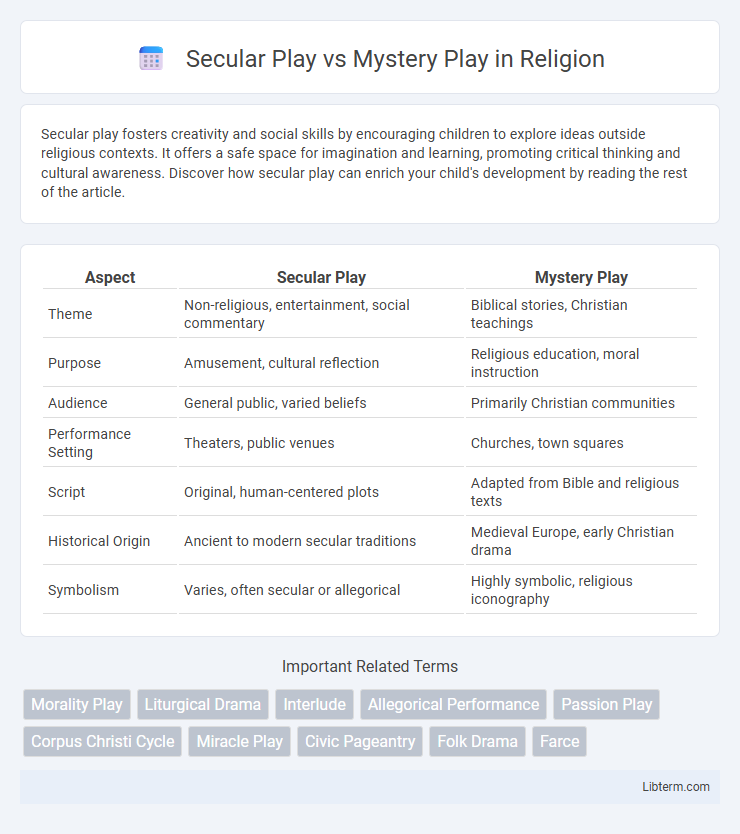Secular play fosters creativity and social skills by encouraging children to explore ideas outside religious contexts. It offers a safe space for imagination and learning, promoting critical thinking and cultural awareness. Discover how secular play can enrich your child's development by reading the rest of the article.
Table of Comparison
| Aspect | Secular Play | Mystery Play |
|---|---|---|
| Theme | Non-religious, entertainment, social commentary | Biblical stories, Christian teachings |
| Purpose | Amusement, cultural reflection | Religious education, moral instruction |
| Audience | General public, varied beliefs | Primarily Christian communities |
| Performance Setting | Theaters, public venues | Churches, town squares |
| Script | Original, human-centered plots | Adapted from Bible and religious texts |
| Historical Origin | Ancient to modern secular traditions | Medieval Europe, early Christian drama |
| Symbolism | Varies, often secular or allegorical | Highly symbolic, religious iconography |
Introduction to Secular and Mystery Plays
Secular plays emerged in medieval Europe as forms of entertainment reflecting everyday life, often incorporating humor, satire, and social commentary outside religious doctrine. Mystery plays, rooted in Christian liturgical traditions, dramatized biblical stories and were performed to educate and inspire faith among the largely illiterate medieval population. Both play types contributed to the development of early theater, with secular plays expanding thematic variety and mystery plays reinforcing communal religious identity.
Historical Origins of Secular and Mystery Plays
Secular plays originated in medieval Europe as entertainment outside church settings, often performed during festivals and market days, reflecting everyday life and social satire. Mystery plays, also known as miracle or biblical plays, emerged from religious rituals and liturgical ceremonies in the 10th to 13th centuries, dramatizing biblical stories to educate largely illiterate audiences. The historical divide lies in secular plays developing from popular culture and folk traditions, while mystery plays evolved directly from ecclesiastical contexts.
Defining Characteristics of Secular Play
Secular plays focus on everyday life and human experiences, emphasizing comedy, romance, and social satire without religious themes. They often feature characters drawn from common society and address contemporary issues or local customs, providing entertainment that is accessible and relatable to the general public. Unlike mystery plays, which dramatize biblical stories for moral instruction, secular plays prioritize amusement and cultural reflection through diverse narrative genres.
Key Elements of Mystery Play
Mystery Play centers on biblical narratives, emphasizing religious themes, moral lessons, and the dramatization of Christ's life, death, and resurrection. Key elements include the use of allegorical characters, episodic structure based on scriptural events, and a didactic purpose intended to educate medieval audiences about Christian doctrine. The performances often involved community participation, sacred costumes, and were staged during religious festivals, reinforcing faith and communal identity.
Thematic Differences: Secular vs Mystery Plays
Secular plays primarily explore everyday life, human relationships, and social issues, emphasizing humor, romance, and moral lessons without religious undertones. Mystery plays focus on biblical stories and Christian theology, dramatizing sacred narratives such as the Creation, the Passion of Christ, and the Last Judgment to educate and inspire faith. These thematic differences highlight secular plays' engagement with contemporary society, while mystery plays center on spiritual instruction and religious tradition.
Social and Cultural Impact
Secular plays, emerging during the Renaissance, reflected everyday life and social issues, fostering community identity and collective participation beyond religious contexts. Mystery plays, rooted in medieval Christian traditions, reinforced religious teachings and moral values while uniting diverse social classes through shared spiritual narratives. Both forms shaped cultural consciousness, with secular plays advancing individual expression and societal critique, whereas mystery plays sustained communal faith and moral order.
Performance Styles and Audience Engagement
Secular plays prioritize realistic acting styles and relatable, everyday scenarios, engaging audiences through humor and contemporary social themes. Mystery plays employ symbolic, ritualistic performance styles rooted in religious narratives, fostering communal participation and spiritual reflection among medieval viewers. Audience engagement in secular performances leans toward entertainment and satire, whereas mystery plays evoke collective moral contemplation and devotion.
Notable Examples of Each Genre
Notable examples of secular plays include Shakespeare's "Twelfth Night" and Moliere's "Tartuffe," both showcasing human comedy and social satire without religious themes. In contrast, mystery plays such as the York Cycle and Wakefield Cycle depict biblical stories, performed in medieval England to educate audiences on Christian doctrine through dramatized scripture. These distinct genres highlight the secular celebration of everyday life versus the sacred focus on spiritual narratives in medieval theatrical traditions.
Evolution and Legacy in Modern Theatre
Secular plays evolved during the Renaissance by shifting from religious narratives to human-centered themes, reflecting societal changes and fostering the development of modern drama. Mystery plays, originating in the medieval period, introduced structured storytelling and ensemble performance that influenced theatrical conventions even after their decline. The legacy of both forms persists in contemporary theatre through the integration of moral complexity and community engagement in storytelling.
Conclusion: Lasting Significance of Both Forms
Secular play and mystery play each hold lasting significance by reflecting distinct cultural and social functions in medieval society. Secular plays provided entertainment and social commentary accessible to everyday people, while mystery plays preserved religious narratives through dramatic art, reinforcing communal faith and moral values. Together, these forms illustrate the dynamic interplay between entertainment and spirituality in shaping historical theatrical traditions.
Secular Play Infographic

 libterm.com
libterm.com